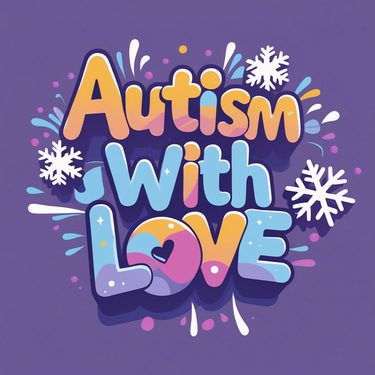What is Autism? Support for ASD
World Autism Awareness Day is an internationally recognized day annually on 2 April, April is Autism Acceptance Month.
AUSTISM SUPPORT
W.Love
4/3/20255 min read


I realized that I jumped straight into this blog without really defining what autism is. I figure most people who are searching have already had this question answered, but I was wrong. I get a couple of emails a week asking for me to explain what autism is and how it impacts our family. I try to have a mix of academic and personal accounts so I can have a well rounded answer. It starts like this.....
According to a recent study published in the journal "Autism Research," ASD is defined as a lifelong disorder with varying severity and manifestations, affecting individuals differently across the spectrum. This variability is critical in understanding autism, as it emphasizes the uniqueness of each person's experiences and behaviors. So autism is a personal disorder than can so many variations, my younger two on the spectrum are completely different.
Another article in the Journal of Autism and Developmental Disorders outlines the core characteristics of ASD, including difficulties in social interactions, such as challenges in understanding social cues, engaging in conversations, and developing peer relationships. These challenges are often coupled with repetitive patterns of behavior, which may manifest as an insistence on sameness, rituals, or intense focus on specific interests. This duality — social-communication deficits alongside restricted behaviors — forms the crux of autism's definition. For instance, my 5 year old is non verbal or preverbal, whatever. That's for another day. But he doesn't speak and has sensory input issues, reacts to loud noises, screams when he is frustrated, has a restricted diet, etc.
A further contribution from "Research in Autism Spectrum Disorders" highlights the complexities of diagnosing ASD, stressing that autism is a spectrum disorder, meaning that the intensity and type of symptoms can vary widely among individuals. Some may exhibit mild traits that do not significantly impair daily functioning, while others may face substantial challenges requiring comprehensive support throughout their lives. This spectrum characteristic underscores the importance of individualized approaches to care and intervention, helping to better meet the needs of each person with autism.
Understanding autism reveals a multifaceted condition marked by variability in presentation and complexity in its diagnostic criteria, which is why I always recommend getting a second opinion. Recognizing these nuances is essential for developing effective strategies and support systems for individuals diagnosed with autism spectrum disorder (ASD).
Autism Screening: Early Intervention Importance and Methods
Early diagnosis of autism spectrum disorder (ASD) is paramount, particularly for children aged 0-5. Autism screening forms a crucial part of the developmental process, enabling parents and healthcare providers to identify potential signs of autism at an early stage. According to the Centers for Disease Control and Prevention, CDC approximately 1 in 36 children are diagnosed with autism, highlighting the importance of systematic screening methods to ensure timely intervention and support. This figure reflects a significant rise from previous years, highlighting both the growing awareness of autism and advances in diagnostic criteria and capabilities.
The data trends indicate that autism diagnoses are becoming more common across various demographics. It has been observed that while ASD can affect individuals of all backgrounds, certain groups may show varying prevalence rates. Studies show that boys are diagnosed with autism at a substantially higher rate than girls, with the current ratio being approximately 4:1. This discrepancy raises questions regarding biologic and environmental factors that may contribute to such differences. I personally this autism manifest differently in girls and since being 'quiet' isn't disruptive, many girls are not tested. Learn the Signs, Act Early
Screening for autism typically involves the use of standardized tools designed to evaluate developmental milestones. The most recommended instruments include the Modified Checklist for Autism in Toddlers (M-CHAT) and the Ages and Stages Questionnaires (ASQ). These 'tools' are designed to assess various aspects of a child’s behavior, social skills, and communication abilities, providing a comprehensive overview that can signal the need for further evaluation. The American Academy of Pediatrics advocates for regular screening during well-child visits at 18 and 24 months to identify children at risk of ASD. Tools are just questionnaire and standardized observations, they aren't stressful, but you need to be ready to accept the new language around a diagnosis.
Early intervention plays a crucial role in supporting children diagnosed with autism spectrum disorder (ASD). Research has consistently shown that initiating intervention strategies during the critical developmental years — typically before the age of three — can substantially improve outcomes for children with autism. At this early stage, children’s brains are particularly receptive to learning, making it a prime time for targeted support. Children identified earlier can access interventions — such as applied behavior analysis (ABA), behavioral therapy, speech therapy, and occupational therapy — tailored to their unique needs.
My three year old is currently working on sitting for 5 minutes in OT, she is so active. Research indicates that early intervention significantly improves outcomes, allowing children to develop essential life skills, improve social interactions, and enhance learning capabilities. While many parents may feel hesitant to initiate screening due to misconceptions about autism, it is vital to understand that early identification and appropriate support can help pave the way for a fulfilling life despite the challenges posed by autism.
Families also experience positive effects, as early intervention programs often include support for parents, providing them strategies to assist their children's development as much as possible.
Embracing the Journey: The Importance of Patience
Supporting a child with autism can be a multifaceted journey that requires an immense amount of patience and understanding. I could write a blog (lol) about the range of challenges, from communication barriers to sensory sensitivities, which may test their resilience and coping skills. Recognizing that each child with autism is unique is essential, as their needs and responses can vary significantly. This individuality often makes the process of understanding and supporting their requirements both rewarding and sometimes frustrating.
Awareness as well as teaching coping strategies and tools to the child often requires repetition and persistence. A patient approach allows families to understand that progress may not always be linear; there will be ups and downs along the way. Celebrating small achievements can motivate both the child and the family, reinforcing the idea that every step forward is significant. When families demonstrate consistent patience, they model a vital life skill for their child, instilling resilience and adaptability as they face the complexities of autism. Create a safe space.
As families navigate this journey, it is essential to connect with support networks, share experiences, and educate others about the challenges and strengths that come with autism. By doing so, they can cultivate a broader understanding and acceptance, ultimately benefiting not just their child but the community as a whole. Patience, therefore, is not merely a necessity but the foundation upon which positive growth and relationships are built throughout this journey.
A Message for Autism Awareness Month
Autism Awareness Month, held in April, serves as a critical platform for fostering understanding and acceptance of individuals on the autism spectrum. Autism Acceptance Month celebrates and honors the experiences and identities of Autistic individuals. It emphasizes understanding, inclusion, and support, moving beyond awareness towards meaningful acceptance.
Don't be afraid of sharing personal stories and experiences can provide valuable insights into the lives of those with autism and their unique perspectives. By lending a voice to autistic individuals, we can highlight their strengths and capabilities. Furthermore, World Autism Month, initiatives in schools, workplaces, and communities can create an environment that fosters acceptance and supports neurodiversity.
Celebrating Autism Awareness Month in April also involves acknowledging the significant contributions of individuals with autism in various fields, showcasing their talents and achievements. By focusing on abilities rather than challenges, we can shift public perceptions and cultivate a more inclusive society. As we recognize World Autism Awareness Day (WAAD), let us collectively commit to promoting understanding, acceptance, and support for individuals with autism, ensuring that they feel valued and empowered within their communities.
